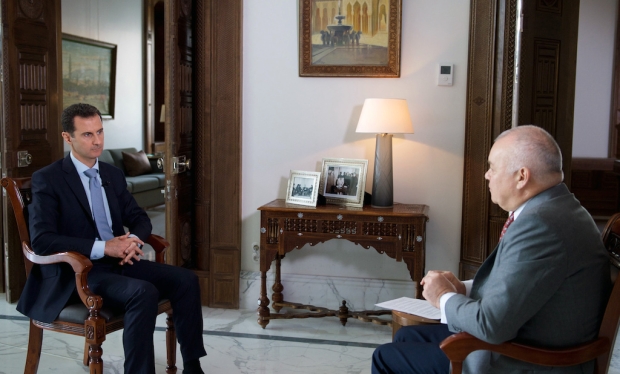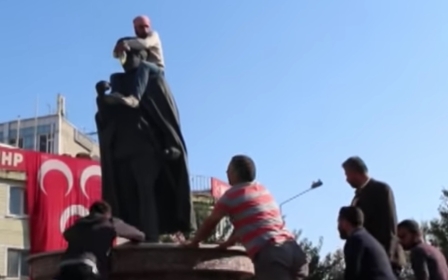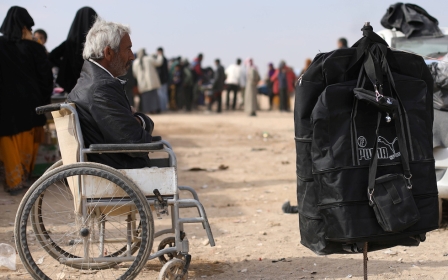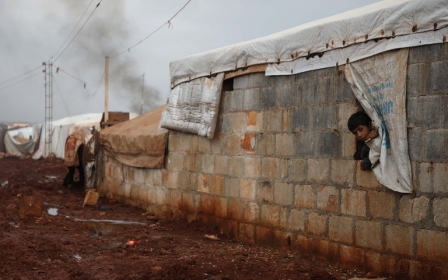Journalists in Damascus live in 'forced silence' as government stifles dissent
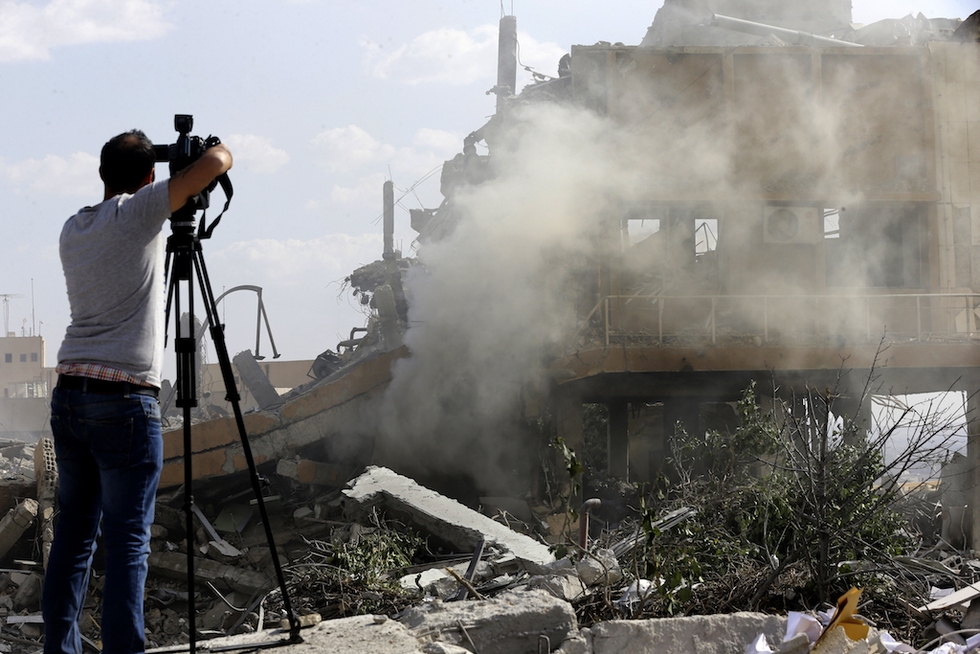
AMMAN - It was the noises that would haunt Alaa* the most. As she went about life in her government-held neighbourhood of central Damascus, the sounds of nearby air strikes and surface-to-surface missiles would invite themselves unannounced into her home at all hours of the day.
To have lived in Syria’s capital city at the time was to “fall asleep and wake up to the sounds of relentless bombing”, reflects the Damascus-born former journalist, who fled the country with her husband last year.
In Damascus, the war seeped into almost all aspects of her life.
Alaa was working in a state-run news website last year when the Syrian government stepped up its bombing on the opposition-held Eastern Ghouta suburbs - where her brother had been killed in pro-government bombardments several years earlier.
In the office, Alaa couldn’t tell her co-workers about him, fearing "regime loyalists" among them.
“None of my colleagues even knew [about my brother] until a year after I started working at the office,” Alaa remembered.
“There was always a sense of fear and caution in my relationships with people in Damascus.”
The regime considers us criminals - that we’re the ones behind the revolution. The government may despise an activist even more than a fighter
- Syrian media activist
At the same time, Alaa’s then-fiance worked under threat of bombardment as a nurse in a separate opposition-held pocket outside the capital. Sometimes at work, she’d come across news online that left her fearing for his life.
During one pro-government bombardment on outer Damascus in 2016, “the hospital [where my fiance worked] was bombed,” she remembered. “I was at [work] following the news.
“I felt like collapsing. I couldn’t say anything to my colleagues or express anything.”
Backed by heavy air strikes and artillery fire, pro-government forces eventually seized the area where her fiance was living, before retaking Eastern Ghouta earlier this year - part of a series of major victories that have allowed the Syrian government to reassert control over much of the country since 2016.
Working in secret
Working in one of the world’s most restrictive - and deadly - countries for the press, Syrian journalists still living in government areas describe an atmosphere of forced silence weighing ever more heavily as the authorities broadcast a narrative of victory following seven years of bloody conflict.
It’s a narrative that excludes reporting by Syrian journalists and photographers somehow still interviewing sources and filing reports from within government territory, despite the threat of surveillance, harassment or arrest.
Many work in secret, keeping their identities and jobs concealed from the government as well as even close friends and family.
All seven journalists who agreed to speak with Syria Direct for this report - including a young woman confined to her hometown, a photojournalist documenting Damascus’ streets in secret and a woman arrested several times by security forces - spoke on condition of anonymity fearing for their personal safety.
All expressed a sense of extreme anxiety about their careers, having to deal with checkpoints and ever-watchful mukhabarat (intelligence) agencies as part of their daily routines.
Their fears call into question the future of a Syrian press that saw citizen journalism and media activism flourish after the beginning of the 2011 uprising, and which has since been confined to increasingly repressive rebel-held areas further north.
Citizen journalists
The early days of Syria’s uprising were told by journalists as well as mobile phone videos, tweets and blogs.
Opposition-affiliated local councils often established their own makeshift media centres, while activists and reporters on the ground closely documented the country’s shift from street protests to all-out conflict.
With foreign reporters’ access to certain areas of the country heavily restricted, and then new dangers posed by hardline groups like the Islamic State, the world instead relied on Syrians reporting from the ground.
The changing fates of Syria’s opposition has changed all that. With the Syrian government having retaken much of the country, the modicum of freedom once felt in places outside Damascus has gradually slipped away.
In formerly rebel-held areas such as Daraa province, Eastern Ghouta and East Aleppo, those who once reported on the ground themselves or communicated regularly with outside journalists have either fled or gone silent for fear of reprisals by government security forces.
When the Syrian government and allied forces made their lightning advance on southern Daraa, once a major rebel stronghold, earlier this year, nearly 300 journalists and media workers there suddenly found themselves trapped in a terrifying limbo.
They could either keep fleeing south towards the last sliver of holdout rebel territory along the long-closed Syrian-Jordanian border, or accept the government’s oncoming advance.
The stakes were particularly high for journalists, media workers and activists who had lived and worked under opposition authorities in Daraa province. Many feared punishment.
“The regime considers us criminals - that we’re the ones behind the revolution,” one local media activist told Syria Direct at the time.
“The government may despise an activist even more than a fighter.”
Kingdom of silence
That Syria is a repressive environment for the press is hardly new. For decades, security forces used brute force as well as an arsenal of official legislation curbing press freedoms to rein in reporting that came anywhere near veering from the government’s official narrative.
It was one of the ways that Syria earned its old moniker, the “kingdom of silence”.
Since 1974, aspiring Syrian reporters have had to register with the state-run Union of Syrian Journalists (SJU), which maintains strict barriers to join - meaning those working as freelancers or for private outlets are barred entry. And an emergency law enacted in 1963, the year the Baath Party seized power in a military coup, severely restricted press freedoms for decades until it was rescinded in 2011.
However, the independent journalism and media activism that emerged from the uprising has seen the Syrian government restrict press freedoms even more heavily than before.
At the height of protests that would later morph into Syria’s devastating war, the Syrian parliament announced a decree - No 108 for the year 2011 - that would entrench legal repression of journalists across government-controlled areas of the country.
Though it supposedly banned the “arrest, questioning or searching” of media workers, the decree also called on journalists to use freedom of speech with “responsibility”, without determining what responsible freedom of speech should entail.
“I don’t trust anything they say,” one Syrian freelance journalist told the Committee to Protect Journalists (CPJ) watchdog group regarding the decree.
Then in summer 2012, the government passed the wide-reaching Counterterrorism Law 19, which - among other things - criminalised “publishing terrorist acts” and “promoting terrorist activities”.
The law has since been used to prosecute a number of media workers, activists and human rights defenders - including Mazen Darwish, a Syrian lawyer and head of the Syrian Center for Media and Freedom of Expression.
Law 19 was a “turning point”, said Sherif Mansour, CPJ’s Middle East and North Africa programme director.
“The government is using anti-terrorism law to go after journalists. That’s their strategy to circumvent and challenge criticism.
“[But] Syria has always been a restrictive country,” he added. “There was no free press in Syria [before 2011].”
Called in for questioning
Outside the capital, in a government-held expanse of Syria's countryside, Dina is afraid.
On the surface, she insists, life there is normal - government checkpoints are relatively few and far between and, as a young woman, she faces little security scrutiny when walking outside her house.
As a freelance journalist, the relative freedom to move around for interviews and photography has allowed her a space to work quite unlike her colleagues in the centre of Damascus. And though she has always used a pseudonym when publishing her work, Dina said she’s long felt at least a modicum of safety.
And yet, earlier this year, Dina tells Syria Direct, she received a phone call that quickly shattered that sense of ease: a security official contacted her via phone, requesting that she come into his office for “questioning”.
So she rang a friend with security contacts, passing along a sensitive request.
When I see someone walking towards me in the street, it raises my stress levels,” Dina said. “Why are they coming towards me? Are they going to take me away?
- Dina, journalist
“I asked him to do a search of my name [in the computerised wanted lists used by Syria’s security apparatus], to see if it was there,” she recalled.
Dina would soon find out that her name was among those on the government’s wanted lists. She isn’t sure how long it’s been there.
Dina suspects it’s for her work as a journalist, although her file does not point to any specific crime actually committed.
Though warm and bubbly online, Dina describes herself as shy with those who don’t know her well - a woman who keeps her personal beliefs to herself and maintains a small group of only her “most trusted” friends and family members.
Yet as a journalist, she’s sociable and seemingly always available to talk, often lightheartedly. Interspersed in online chats about her fears of arrest, she sends pink heart emojis and pictures of tabletop spreads of freshly cooked Syrian food.
But in Dina’s hometown, only a handful of friends and family even know about what she describes as her “dream in life”: journalism.
“Even my aunts and uncles don’t know [about my job],” she said.
She’s been left with a debilitating sense of paranoia. Dina hardly leaves her hometown, let alone her house, she said, out of fear of what could happen outside. She doesn’t take pictures anymore.
Her dreams of travelling abroad, or even to Damascus, are on hold because it would involve passing through pro-government checkpoints.
“When I see someone walking towards me in the street, it raises my stress levels,” Dina said. “Why are they coming towards me? Are they going to take me away?
“The anxiety over the fact that I’m wanted [by the security forces] terrifies me.”
Her fears aren’t unfounded - by 2017, as many as 29 Syrian “media professionals” had died in government prisons since the beginning of the 2011 protests, according to a recent report by the watchdog group Syrian Journalist Association (SJA).
The group has meanwhile documented dozens of violations against journalists across the country in 2018, including arrests and harassment of those working in government territory.
The number of those killed or arrested could very well be higher than observers are currently able to determine, SJA president Ali Eid, who worked for state news agency SANA until the start of the war, tells Syria Direct.
"With the nature of the situation, we have colleagues in areas under regime control who simply can't disclose statistics or names due to SJA's fraught relationship with the regime," he said.
"It's impossible to write one word in the media without it being under surveillance," Eid said of his own time working at SANA.
"There is pressure and restriction - there are some brave journalists who try to talk about sensitive issues, but flirting with these issues always ends with victims."
Medicating fear
The toll has been such for Manal, a freelance journalist who often communicates with foreign outlets, that she’s taken medication for anxiety and turned to psychological counselling for help.
Fear has seeped into her work as well, she said.
“When I interview people, oftentimes I do it without telling them I’m speaking to them as a journalist. I know this is against journalism ethics, but you just can’t always reveal your identity as a journalist here,” Manal explained.
“For example, if I want to work on a piece about transportation, I don’t say [to sources] that I’m writing a report on vehicles or driving laws. I’ll tell people: ‘I’m thinking about buying a car,’ or, ‘My family wants to sell their car - what are the steps?’”
Someone who dies while moving forward is better than the one who dies stepping back. So I’m still working
- Dina, journalist
Manal has already been detained several times by the government’s security forces, she said, due to her work.
Each time, her family members were able to pay money to release her. But she’s afraid of yet another arrest - a potent fear as the government continues to release the names of political detainees killed and executed within its vast network of prisons and security branches since 2011.
“I’m still afraid of security,” she told Syria Direct. “That is the main problem.”
Damascus-based photojournalist Samer said he, too, fears government detection when documenting the capital’s streets. He volunteers for Lens Young Dimashqi, a team of amateur photographers who post regularly on the group’s Facebook page.
Though the majority of Lens Young Dimashqi’s posts are simple street scenes, some include city storefronts and highways adorned with posters of President Assad. One recent post derided the government’s reported killing of Syrian-American activist Layla Shwekani, who had been detained in 2016.
“Our staff is always exposed to danger,” said Samer, acknowledging that sometimes his group’s posts include “content that the regime doesn’t want”.
The space for independent journalism, let alone journalism itself, has shrunk.
If no change occurs with the government’s treatment of journalists, that would respect the media and consider it a basic entity for keeping the authorities in check, then there will be no future [for journalism]
- Mohammed Bassiki
“Journalists [in government territory] are simply not able to cover what is happening,” said Mohammed Bassiki, editor-in-chief of the Syrian Investigative Reporting for Accountability Journalism (SIRAJ) media training group.
“If no change occurs with the government’s treatment of journalists, that would respect the media and consider it a basic entity for keeping the authorities in check, then there will be no future [for Syrian journalism] - not now, not ever.”
Abandoning journalism
Others have turned their back on journalism about Syria altogether. One journalist interviewed for this report said she has decided against reporting on her home country from where she now lives, abroad, fearful of reprisals against family members still living within government territory.
“I hear about things [in Syria] that would work well as stories, but when I think about interviewing people, I know it’ll attract unwanted attention,” she tells Syria Direct.
“I can’t get myself blacklisted in Syria, because then I wouldn’t be able to visit my family.”
Still, there are those on the ground who insist on covering the now growing sectors of the country under government control.
Dina, for one, still regularly keeps in touch with her contacts remotely and finds ways to work around the fact that she's wanted for arrest.
There are risks, and she accepts them.
“Someone who dies while moving forward is better than the one who dies stepping back,” Dina said.
“So I’m still working."
*The names of all journalists within Syria quoted in this report have been changed to protect their safety.
Syria Direct is a non-profit journalism organisation that focuses on coverage of Syria. Read the original article on Syria Direct. Follow Syria Direct on Twitter.
New MEE newsletter: Jerusalem Dispatch
Sign up to get the latest insights and analysis on Israel-Palestine, alongside Turkey Unpacked and other MEE newsletters
Middle East Eye delivers independent and unrivalled coverage and analysis of the Middle East, North Africa and beyond. To learn more about republishing this content and the associated fees, please fill out this form. More about MEE can be found here.



